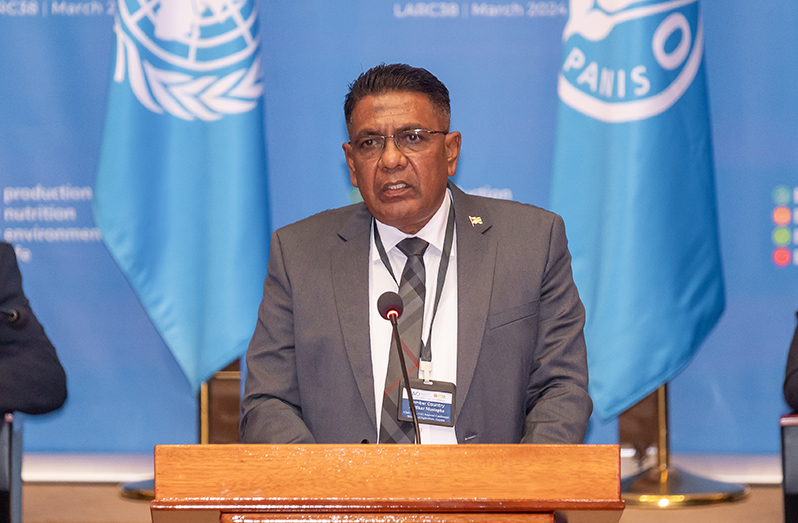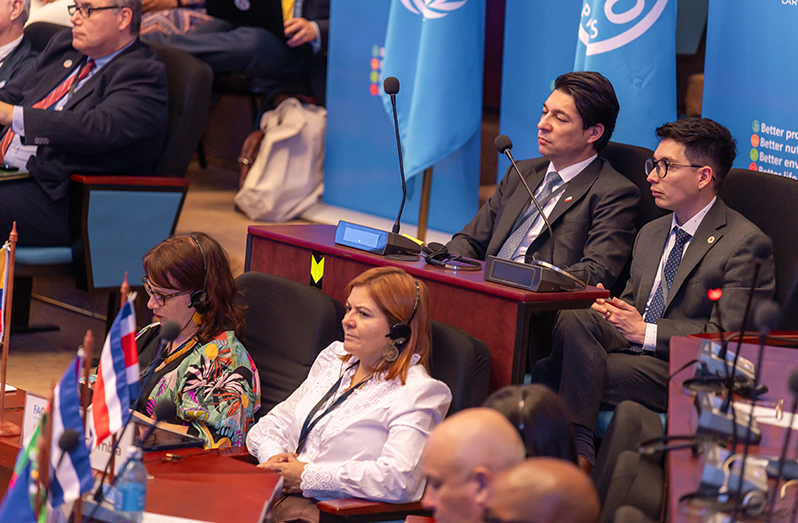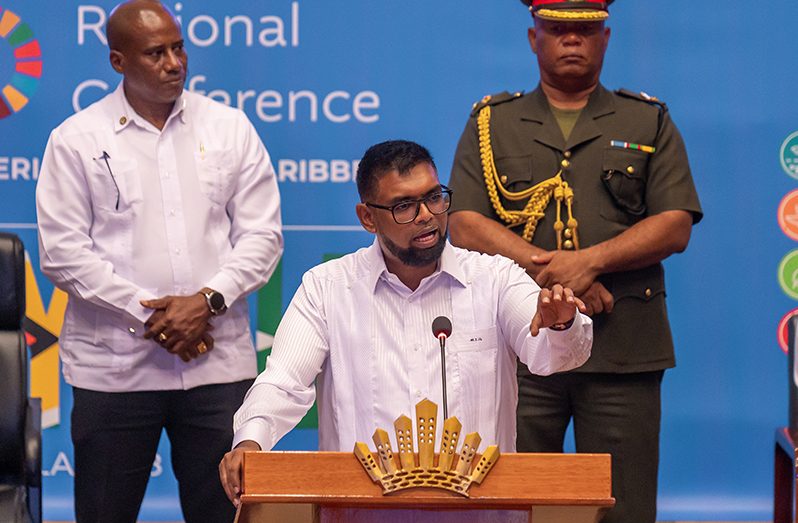–President Ali tells regional agriculture summit
WITH recent statistics showing millions affected by hunger and malnutrition, Guyana’s President Dr. Irfaan Ali has urged regional leaders to outline decisive polices that will reflect the political will and financing needed to address these food insecurities.
The Head of State made this charge at the 38th Session of the United Nations Food and Agriculture Organisation (FAO)’s Regional Conference for Latin America and the Caribbean (LARC) that is being held in Georgetown, Guyana this week.
“Many of us say we want to end hunger and end starvation and malnutrition, but if you look at our budgetary allocation, it does not reflect that will; if you look at the expenditure profile, it does not reflect that will,” Dr. Ali said in his address to agriculture ministers and other leaders gathered at the Arthur Chung Conference Centre (ACCC) on Monday.
He went on to say, “Political will is not only about shouting out the message, it’s about taking policy action and making policy intervention that addresses the issues. Political will is about making the necessary adjustments and changes in your own local system to support the message we’re putting forward.”

In the region, he said, there is a clear need for more financial investments and insurance to support the strong build out of the food production system.
“We in the region understand that financing and insurance is a critical component in the food production system and we have to address these issues, we cannot go on without finding innovative ways in which we could address issues of financing and insurance to support the food production ecosystem of which agriculture is a key component,” the Head of State said.
He stressed that officials in the region need to examine their budgetary spending in the agriculture sector, and their respective food production systems to increase sustainability.
Guyana has already made some progress with the country’s budgetary allocation for the agriculture sector, with this increase from $13.3 billion in 2019 to $97.6 billion in 2024.
Aside from this, Guyana has been exploring innovative programmes to involve more youth and women in the production of food, and already the country has reached its target of having 35 per cent of this demographic represented in the sector.
The country has also been harnessing the use of technology to advance its agriculture food systems.
Dr. Ali, who is also the current Chairman of the Caribbean Community (CARICOM), further highlighted the work ongoing by the 15-member regional bloc to foster more partnerships to achieve its regional food security goals.
President Ali also holds the responsibility for food security and nutrition in CARICOM. Aside from the issues of financing and insurance, he highlighted the need for leaders to address the needs of agriculture stakeholders, stating that there are 700 million people within the sector that are affected by poverty.
“Food production is not only about food; it’s about the people who are involved in the system,” he stressed.
The regional FAO summit is one of several official forums where ministers of agriculture and high-level officials of member nations from the same geographic region meet to discuss challenges and priority matters related to food and agriculture.

The ongoing summit, which will see the participation of 33 countries from the across region and over 100 delegates, is being chaired by Guyana’s Agriculture Minister Zulfikar Mustapha, who, at the opening ceremony, also stressed the need for more investments to the sector.
“There is a need to improve initiatives, financial support, and concrete action to increase the resilience and sustainability of agri-food systems to overcome the impacts of climate change and food insecurity, in light of the region’s high vulnerability,” Mustapha said.
Following Monday’s opening session, regional leaders will transition into the ministerial segment to foster deeper cooperation and strategies on essential topics such as sustainability, transformation, food security, agri-food systems and climate change.
“Let us utilise the opportunity that this conference presents to discuss priority issues through sharing experiences and challenges of transforming our agri-food systems, in light of the reality of each member state and the region as a whole,” Minister Mustapha, who also chair’s CARICOM’s food security ministerial taskforce, said.




.png)









